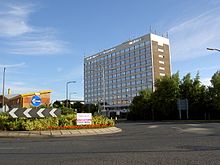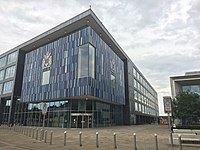|
City of Doncaster Council
City of Doncaster Council is the local authority of the City of Doncaster, a metropolitan borough with city status in South Yorkshire, England. Prior to being awarded city status in 2022 the council was called Doncaster Metropolitan Borough Council. The council is based at the Civic Office in Waterdale, central Doncaster. It is one of four local authorities in South Yorkshire and provides the majority of local government services in Doncaster. The council is a member of the South Yorkshire Mayoral Combined Authority. The council is led by a directly elected mayor. Since 2013 the post has been held by Ros Jones of the Labour Party. HistoryThe town of Doncaster was an ancient borough, with its first known charter dating from 1194.[3][4] The borough was reformed to become a municipal borough in 1836 under the Municipal Corporations Act 1835, which standardised how most boroughs operated across the country. By 1927 the borough was considered large enough to run its own county-level services, and so it was made a county borough, independent from West Riding County Council.[5] The county borough was abolished in 1974 and replaced by the larger Metropolitan Borough of Doncaster, which also took in the abolished urban districts of Adwick le Street, Bentley with Arksey, Conisbrough, Mexborough, Tickhill, the rural districts of Doncaster and Thorne, and (from Nottinghamshire) the parish of Finningley and part of the parish of Harworth (the latter being added to the parish of Bawtry).[6][7] From 1974 until 1986 the council provided district-level services, with county-level services provided by South Yorkshire County Council. Following the abolition of the county council in 1986, Doncaster also took on county-level services, with some functions provided in joint arrangements with the other South Yorkshire boroughs.[8][9] Since 2014 the council has been a constituent member of the South Yorkshire Mayoral Combined Authority (called the Sheffield City Region until 2021), which has been led by the directly elected Mayor of South Yorkshire since 2018. The borough was awarded city status in 2022, after which the council changed its named to City of Doncaster Council.[10] GovernanceThe council provides both district-level and county-level services. Some functions are provided through joint committees with the other South Yorkshire authorities. Much of the borough is covered by civil parishes, which form an additional tier of local government for their areas.[11] Political controlThe council has been under Labour majority control since 2010. Political control of the council since the 1974 reforms has been as follows:[12][13]
LeadershipPrior to 2002, political leadership was provided by the leader of the council. Since 2002, political leadership has been provided instead by a directly elected Mayor of Doncaster. The council separately appoints a civic mayor each year, who is largely ceremonial. The leaders from 1994 to 2002 were:[14]
The directly elected mayors since 2002 have been:
CompositionFollowing the 2021 election and subsequent by-elections and changes of allegiance[19] up to August 2024, the composition of the council (excluding the elected mayor's seat) was:[20]
The next election is due on 1 May 2025. PremisesThe council is based at the Civic Office on Waterdale in Doncaster. It was purpose-built for the council and opened in January 2013.[21]  From 1992 until 2013 the council was based at the Council House on College Road, formerly called Coal House, which had been built in 1966 as the headquarters of the National Coal Board. The Council House was subsequently demolished.[22] ElectionsSince the last boundary changes in 2015 the council has comprised 55 councillors representing 21 wards, with each ward electing two or three councillors. Elections are held every four years.[23][24] From 1973 to 2014, the council was elected by thirds every year except the year in which county council elections took place in other parts of England. In 2015, the whole council was elected due to boundary changes to the wards and it was decided that the whole council would be elected every four years from 2017, so that the council elections would coincide with the election of the Mayor of Doncaster.[25] References
|
||||||||||||||||||||||||||||||||||||||||||||||||||||||||||||||||||||||||||||||||||||||||||||||||||||||||||||||||||||||||||||||||||||||


